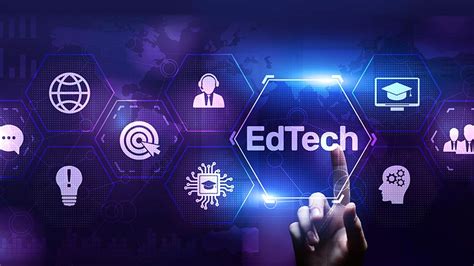Edtech Careers

The field of education technology, or edtech, has experienced rapid growth and transformation in recent years, shaping the way we approach learning and teaching. With advancements in technology, the edtech industry has opened up a wide range of exciting career opportunities, offering professionals the chance to innovate, create, and make a meaningful impact on education worldwide.
In this article, we will delve into the diverse career paths within the edtech industry, exploring the roles, skills, and opportunities that await those passionate about combining education and technology. From developing cutting-edge learning platforms to shaping educational policies, the edtech sector offers a dynamic and rewarding career journey. Join us as we uncover the world of edtech careers, providing insights, expert advice, and a comprehensive guide to navigating this exciting and ever-evolving field.
Unveiling the Edtech Industry

The edtech industry represents a vibrant and innovative sector, driven by a mission to enhance and revolutionize traditional educational practices. By leveraging technology, edtech aims to improve access to quality education, personalize learning experiences, and foster collaboration and engagement among students and educators.
Edtech encompasses a wide array of tools, platforms, and solutions, ranging from online learning management systems and virtual classrooms to educational apps, gamified learning platforms, and data-driven analytics tools. These technologies are designed to support and enrich the learning process, making education more accessible, interactive, and effective.
The global impact of edtech is significant, with its influence reaching students and educators across diverse geographical and socioeconomic contexts. Edtech has the potential to bridge educational gaps, empower learners, and promote lifelong learning, making it a crucial force in shaping the future of education.
Exploring Edtech Career Paths

The edtech industry offers a myriad of career paths, each with its own unique challenges and rewards. Here, we delve into some of the key roles and opportunities available to professionals in this dynamic field.
Edtech Developers and Engineers
At the heart of the edtech industry are the developers and engineers who create and maintain the technological infrastructure that powers educational platforms. These professionals possess a deep understanding of programming languages, software development, and web technologies, enabling them to design, build, and enhance edtech solutions.
Edtech developers work on a diverse range of projects, from developing interactive learning modules and virtual simulation tools to creating intuitive user interfaces and integrating cutting-edge technologies like AI and machine learning into educational platforms. They collaborate closely with educators, designers, and product managers to ensure that the technology aligns with educational goals and delivers an engaging and effective learning experience.
Key skills for edtech developers include proficiency in programming languages such as Python, Java, and JavaScript, as well as expertise in software development methodologies, database management, and cloud computing. Strong problem-solving abilities, attention to detail, and a passion for education are essential traits for success in this role.
Educational Technologists
Educational technologists play a pivotal role in bridging the gap between technology and education. They are responsible for integrating technology into educational settings, ensuring that it aligns with learning objectives and enhances the overall teaching and learning experience.
These professionals work closely with educators, administrators, and students to identify their technology needs, evaluate and select appropriate edtech tools, and provide training and support for their effective implementation. Educational technologists also contribute to the design and development of instructional materials, ensuring that technology is used strategically to promote active learning, collaboration, and critical thinking.
Key skills for educational technologists include a solid understanding of learning theories and instructional design principles, as well as expertise in educational technology tools and platforms. Strong communication and collaboration skills are essential, along with the ability to adapt and innovate in response to changing educational landscapes.
Edtech Product Managers
Edtech product managers are the driving force behind the development and success of edtech products and platforms. They are responsible for defining product vision, strategy, and roadmap, ensuring that the product meets the needs and expectations of its target audience.
These professionals work closely with cross-functional teams, including developers, designers, and educators, to gather requirements, prioritize features, and oversee the product development lifecycle. Edtech product managers also play a crucial role in market research, competitor analysis, and user testing, ensuring that the product remains relevant, competitive, and aligned with industry trends.
Key skills for edtech product managers include strong product management and project management skills, as well as a deep understanding of the education sector and its unique challenges. Excellent communication, leadership, and strategic thinking abilities are essential for success in this role, along with the ability to balance business objectives with educational goals.
Instructional Designers and Content Developers
Instructional designers and content developers are the creative minds behind the development of engaging and effective educational content for edtech platforms. They work closely with subject matter experts, educators, and technologists to design and create interactive learning materials, online courses, and multimedia resources.
These professionals employ a range of instructional design methodologies and best practices to ensure that the content is accessible, relevant, and aligned with learning objectives. They collaborate with developers to integrate the content into edtech platforms, ensuring a seamless and immersive learning experience for users.
Key skills for instructional designers and content developers include expertise in instructional design theories and practices, as well as strong writing, editing, and multimedia production skills. A deep understanding of the subject matter and the ability to translate complex concepts into accessible and engaging content are essential traits for success in this role.
Edtech Sales and Marketing Professionals
Edtech sales and marketing professionals are responsible for promoting and selling edtech products and services to schools, educational institutions, and other stakeholders. They play a crucial role in raising awareness, generating interest, and driving adoption of edtech solutions, ultimately contributing to the growth and success of the industry.
These professionals employ a range of marketing strategies, including content marketing, social media campaigns, and industry events, to reach and engage their target audience. They also collaborate closely with product teams to understand the unique value proposition of edtech products and tailor their messaging and positioning accordingly.
Key skills for edtech sales and marketing professionals include strong communication and presentation skills, as well as a deep understanding of the education sector and its decision-making processes. The ability to build and nurture relationships, coupled with a results-oriented mindset, is essential for success in this role.
Skills and Qualifications for Edtech Careers
The edtech industry demands a unique blend of technical, educational, and interpersonal skills. While specific requirements may vary depending on the role and organization, there are several core competencies that are highly valued across the industry.
Technical Skills
Proficiency in programming languages, software development, and web technologies is a fundamental requirement for many edtech roles. Developers, engineers, and product managers often need a strong technical background to design, build, and manage edtech solutions.
Additionally, expertise in educational technology tools, learning management systems, and data analytics platforms is highly advantageous. Professionals with a deep understanding of these technologies can effectively integrate them into educational settings and leverage their potential to enhance learning outcomes.
Educational Knowledge and Experience
A solid foundation in education is crucial for many edtech careers. Professionals with a background in teaching, instructional design, or educational research bring valuable insights and perspectives to the industry. Understanding the challenges and needs of educators and learners is essential for developing effective edtech solutions.
Experience in curriculum development, instructional strategies, and assessment methodologies is highly valued, particularly for roles focused on content development and educational technology integration.
Interpersonal and Communication Skills
Edtech is a highly collaborative field, requiring professionals to work effectively with diverse teams and stakeholders. Strong interpersonal skills, including active listening, empathy, and cultural sensitivity, are essential for building trust and fostering productive relationships.
Excellent communication skills, both written and verbal, are critical for conveying complex ideas, collaborating with team members, and effectively communicating the value of edtech solutions to educators, administrators, and other stakeholders.
Problem-Solving and Critical Thinking
The edtech industry is characterized by constant innovation and evolving technologies. Professionals in this field must possess strong problem-solving skills and the ability to think critically to address complex challenges and find innovative solutions.
The ability to analyze data, identify trends, and make data-driven decisions is highly valued, particularly in roles focused on product management, market research, and educational technology integration.
Project Management and Organizational Skills
Many edtech roles involve managing complex projects and coordinating cross-functional teams. Professionals with strong project management skills, including the ability to plan, organize, and execute projects efficiently, are highly sought after.
Additionally, organizational skills, time management, and the ability to work effectively under pressure are essential for delivering high-quality edtech solutions within tight deadlines and changing requirements.
Edtech Career Opportunities and Growth
The edtech industry is experiencing rapid growth and expansion, presenting a multitude of career opportunities for professionals with diverse skill sets and backgrounds. As the demand for innovative educational technologies continues to rise, the industry is poised for significant growth and development.
Market Trends and Future Prospects
The global edtech market is projected to reach significant valuations in the coming years, driven by increasing investments in technology-enabled learning solutions. The COVID-19 pandemic has further accelerated the adoption of edtech, as schools and educational institutions have embraced remote learning and digital tools to continue delivering education during periods of disruption.
As the industry matures, there is a growing focus on personalized learning, adaptive technologies, and data-driven insights. Edtech companies are investing in research and development to create more interactive, engaging, and effective learning experiences, leveraging technologies such as AI, virtual reality (VR), and augmented reality (AR) to enhance education.
Job Market and Salary Prospects
The job market for edtech professionals is highly competitive, with a growing demand for skilled individuals across various roles. Salaries in the edtech industry vary depending on factors such as job role, experience, location, and the specific organization.
Edtech developers and engineers, for instance, often command competitive salaries due to their technical expertise and the high demand for their skills. Similarly, educational technologists and instructional designers with a strong educational background and industry experience can expect attractive salary packages.
The edtech industry also offers opportunities for career growth and advancement. Professionals can progress from entry-level positions to more senior roles, taking on greater responsibilities and leadership positions within organizations. Additionally, the industry's focus on innovation and continuous learning provides ample opportunities for skill development and professional growth.
Tips for Pursuing an Edtech Career

Pursuing a career in edtech requires a combination of passion, skills, and strategic planning. Here are some tips to help you navigate the edtech job market and position yourself for success:
- Develop a Strong Foundation: Invest time in building a solid understanding of the education sector, its challenges, and its unique needs. Gain practical experience through internships, volunteer work, or part-time roles in educational settings.
- Cultivate Technical Skills: Depending on your career path, develop proficiency in programming languages, software development, or educational technology tools. Consider pursuing relevant certifications or online courses to enhance your technical expertise.
- Build a Robust Professional Network: Attend industry events, conferences, and meetups to connect with edtech professionals and stay updated on the latest trends and developments. Networking can open doors to job opportunities and provide valuable insights into the industry.
- Showcase Your Skills and Experience: Create a professional portfolio or online presence that highlights your skills, projects, and contributions to the field. Share your work on platforms such as LinkedIn, GitHub, or personal websites to attract the attention of potential employers.
- Stay Updated and Continuously Learn: The edtech industry is constantly evolving, so it's essential to stay abreast of the latest technologies, trends, and best practices. Engage in professional development activities, attend webinars, and follow industry publications to enhance your knowledge and skills.
- Consider Higher Education: Pursuing a graduate degree or specialized certifications in fields such as educational technology, instructional design, or learning sciences can provide a competitive edge and open doors to advanced roles in the industry.
- Gain Industry Experience: Entry-level positions in edtech companies or educational institutions can provide valuable hands-on experience and a deeper understanding of the industry. These roles often offer opportunities for skill development and networking, setting a strong foundation for your career.
Edtech Careers FAQ
What are the entry requirements for edtech careers?
+Entry requirements for edtech careers can vary depending on the role and organization. However, a bachelor’s degree in a relevant field, such as computer science, education, or a related discipline, is often a minimum requirement. Some roles may also require specialized certifications or graduate degrees, particularly for more senior positions.
What skills are in high demand in the edtech industry?
+The edtech industry values a combination of technical, educational, and interpersonal skills. In-demand skills include proficiency in programming languages, software development, and web technologies, as well as expertise in educational technology tools, instructional design, and learning theories. Strong communication, collaboration, and problem-solving abilities are also highly valued.
How can I stand out in the edtech job market?
+To stand out in the edtech job market, focus on developing a strong portfolio that showcases your skills, projects, and contributions to the field. Highlight your passion for education and technology, and demonstrate your ability to innovate and solve complex problems. Engage in industry networking and stay updated on the latest trends and developments to showcase your knowledge and expertise.
What are the growth prospects in the edtech industry?
+The edtech industry is experiencing rapid growth and expansion, driven by increasing investments in technology-enabled learning solutions. As the demand for innovative educational technologies continues to rise, the industry offers excellent growth prospects for professionals with diverse skill sets and backgrounds. Opportunities for career advancement and leadership positions are abundant, particularly for those who continuously develop their skills and stay updated with industry trends.
What are some common challenges in edtech careers?
+Edtech careers can present unique challenges, including keeping up with rapidly evolving technologies, adapting to changing educational landscapes, and effectively communicating the value of edtech solutions to stakeholders. Additionally, balancing business objectives with educational goals and ensuring the effective integration of technology into educational settings can be complex tasks.



